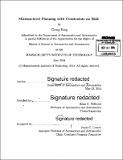Mission-level planning with constraints on risk
Author(s)
Fang, Cheng, (Scientist in aeronautics and astronautics) Massachusetts Institute of Technology
DownloadFull printable version (6.229Mb)
Other Contributors
Massachusetts Institute of Technology. Department of Aeronautics and Astronautics.
Advisor
Brian C. Williams.
Terms of use
Metadata
Show full item recordAbstract
The problem of routing vehicles for data collection is common in the scientific world. In underwater surveys with autonomous vehicles, for example those conducted by the Woods Hole Oceanographic Institute, the autonomous underwater vehicle (AUV) must visit a list of sites to take samples. The order in which the locations are visited should be such that samples are taken during specified time windows, and the total distance travelled is relatively short. An automated planner could act as a force multiplier for all such scientific missions. While current planners in the operations research community can perform vehicle routing with deterministic traversal and deterministic time windows, they are unable to account for stochasticity inherent in real world applications. For example, the time of traversal for vehicles between locations may be uncertain, due to disturbances such as varying currents. Arrival deadlines may also be stochastic, due to the probabilistic times of occurrence for interesting phenomena at each location. Lastly, there is a non-zero probability of failure during traversal, when the vehicle strikes the sea floor due to sudden changes in topography. The ability to plan under uncertainty is vital when we require probabilistic guarantees on success. In this thesis, I consider a novel stochastic single-vehicle routing problem, and propose a chance-constrained solution method. As with previous work, I assume that there exists some roadmap representation of the world with associated costs of traversal, and the vehicle must visit a set of goals subject to a list of temporal constraints. The novelty of my problem is due to the addition of probabilistic times for edge traversal, probabilistic temporal constraints, and stochastic breakdowns on edge traversal. I present a solution method which returns a list of waypoints and a schedule of events which minimises the cost of traversal, subject to an upper bound on the probability of breakdowns and failure to meet temporal constraints. Noting dependence of travel time on path taken, I decompose the problem into two stages. The first stage finds, in best first order, solutions which allow the vehicle to visit the goal locations subject to the upper bound on the probability of breakdowns. Using each solution, the planner can extract the corresponding probabilistic durations for travel times and rewrite these as probabilistic temporal constraints. The second stage solves the resulting chance- constrained probabilistic simple temporal problem (CC-pSTP), in which events must be scheduled such that the probability of failing any of the temporal constraints is below the specified bound. I show that the joint solutions to the first and second stages correspond to valid waypoints and schedules for the original problem, and work through an example problem for an AUV survey mission.
Description
Thesis: S.M., Massachusetts Institute of Technology, Department of Aeronautics and Astronautics, 2014. Cataloged from PDF version of thesis. Includes bibliographical references (pages 89-94).
Date issued
2014Department
Massachusetts Institute of Technology. Department of Aeronautics and AstronauticsPublisher
Massachusetts Institute of Technology
Keywords
Aeronautics and Astronautics.